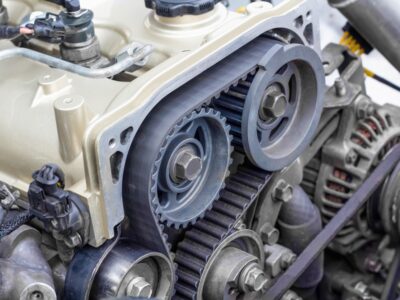
2002 Toyota Camry Clutch Replacement: Everything You Need to Know

If you're a proud owner of a 2002 Toyota Camry, you know that keeping it in top shape is a priority. But just like any vehicle, parts wear out over time, and one of the crucial components that may need attention is the clutch. Whether you're experiencing slipping, difficulty shifting gears, or hearing strange noises when you press the pedal, a clutch replacement might be in your future. In this guide, we'll walk you through everything you need to know about replacing the clutch in your 2002 Toyota Camry, from diagnosis to the actual replacement process, and all the way to ensuring your car drives like new again.
- What Is a Clutch and Why Does It Matter?
- Symptoms of a Failing Clutch in Your 2002 Toyota Camry
- Can You Drive With a Bad Clutch?
- How to Know When It's Time for a Clutch Replacement
- How Much Does It Cost to Replace a Clutch in a 2002 Toyota Camry?
- DIY vs. Professional Clutch Replacement: Which Is Best?
- Step-by-Step Guide: Replacing the Clutch in a 2002 Toyota Camry
- Why DIY Might Be a Good Option
- Preventing Clutch Problems in the Future
- Conclusion
What Is a Clutch and Why Does It Matter?
Understanding the Clutch System in Your Camry
At the heart of your Camry’s manual transmission system is the clutch. It's the component that connects and disconnects the engine from the wheels, enabling smooth gear changes. The clutch consists of several key parts:
- Clutch Pedal: What you press with your foot to engage or disengage the clutch.
- Flywheel: A spinning disc that connects to the engine and helps the clutch disengage smoothly.
- Clutch Plate: The friction plate that connects with the flywheel to transfer engine power to the transmission.
- Pressure Plate: Presses the clutch plate against the flywheel to create friction for transferring power.
- Release Bearing: Allows the pressure plate to disengage when the pedal is pressed.
If any of these components begin to fail, it could lead to difficulties when shifting gears or even complete transmission failure.
Symptoms of a Failing Clutch in Your 2002 Toyota Camry
1. Slipping Clutch
When your clutch is slipping, the engine will rev without a corresponding increase in speed. This usually means the clutch plate is worn out and failing to grip the flywheel properly.
2. Difficulty Shifting Gears
If you struggle to get the car into gear or the gear pops out unexpectedly, it’s a strong sign that your clutch isn’t working properly.
3. Strange Noises When Pressing the Clutch Pedal
If you hear grinding or whining noises when you engage the clutch, it could mean there’s a problem with the pressure plate, release bearing, or flywheel.
4. Unusual Pedal Feel
If the clutch pedal feels either too soft or too hard to press, it could be a sign of a hydraulic system issue or a problem with the clutch itself.
You may be interested in reading 1999 Toyota Camry Clutch Replacement: A Complete Guide to Getting Your Ride Back on Track
1999 Toyota Camry Clutch Replacement: A Complete Guide to Getting Your Ride Back on TrackCan You Drive With a Bad Clutch?
While you can technically drive with a worn-out clutch, it's highly inadvisable. Continuing to drive with a damaged clutch can lead to further damage to your transmission, resulting in expensive repairs down the line.
How to Know When It's Time for a Clutch Replacement
Timing Is Everything
Clutch replacement isn’t something that needs to be done regularly unless you’re pushing your car hard (like in racing or heavy towing conditions). For most drivers, a clutch should last around 100,000 miles, but it could go sooner if the car’s been abused or maintained poorly.
How Much Does It Cost to Replace a Clutch in a 2002 Toyota Camry?
Factors Affecting the Cost
- Labor Charges: Replacing a clutch is labor-intensive, so labor costs can be a significant portion of the price. Expect to pay between $500 and $1,200 for labor alone, depending on the shop’s rates.
- Parts Cost: The price of a clutch kit (including the clutch plate, pressure plate, release bearing, and flywheel) can range from $200 to $800 or more, depending on whether you go with aftermarket or OEM parts.
- Total Replacement Cost: On average, clutch replacement for a 2002 Camry can cost anywhere between $700 and $2,000, depending on the parts used and labor involved.
DIY vs. Professional Clutch Replacement: Which Is Best?
Can You Replace the Clutch Yourself?
If you’re mechanically inclined and have access to the right tools, replacing the clutch in your 2002 Toyota Camry can be a rewarding DIY project. However, keep in mind that it’s a complicated job that involves removing the transmission, which can be heavy and difficult to manage.
When to Seek Professional Help
If you’re unsure about your skills or lack the necessary tools, it’s always better to let a professional mechanic handle the clutch replacement. A skilled mechanic will be able to do the job quickly and correctly, ensuring your car is back on the road in no time.
Step-by-Step Guide: Replacing the Clutch in a 2002 Toyota Camry
Step 1: Gather the Necessary Tools and Parts
- Tools: Jack and jack stands, ratchet set, torque wrench, screwdrivers, and pry bars.
- Parts: Clutch kit (clutch disc, pressure plate, release bearing), flywheel (if needed), and transmission fluid.
Step 2: Lift the Car and Remove the Transmission
- Lift the car using a jack and secure it with jack stands.
- Disconnect the battery to avoid electrical accidents.
- Remove the transmission by unbolting it from the engine and supporting it with a transmission jack.
Step 3: Inspect and Replace the Clutch Components
- Remove the old clutch plate and pressure plate. Inspect the flywheel for damage or excessive wear. If needed, replace or resurface the flywheel.
- Install the new clutch plate onto the flywheel, ensuring it aligns correctly with the alignment tool.
- Mount the pressure plate and torque it to the manufacturer’s recommended specification.
Step 4: Reinstall the Transmission and Reassemble
- Reinstall the transmission carefully, ensuring it engages with the new clutch.
- Reconnect the battery, and top off the transmission fluid.
- Test the clutch by pressing the pedal and shifting through the gears to ensure everything works smoothly.
Step 5: Final Inspection and Test Drive
After reassembling, it’s important to test drive the vehicle to ensure the clutch operates as expected. Pay close attention to the pedal feel and ensure there are no slipping or grinding issues.
Why DIY Might Be a Good Option
Replacing a clutch is a challenging job, but if you enjoy working on cars and want to save money, doing the job yourself can be incredibly rewarding. Plus, you'll gain hands-on knowledge that could come in handy for future repairs.
Preventing Clutch Problems in the Future
1. Avoid Riding the Clutch
One of the biggest mistakes drivers make is riding the clutch, keeping the pedal partially engaged while driving. This causes unnecessary wear on the clutch and can lead to premature failure.
You may be interested in reading 1999 Toyota Camry Clutch Replacement: A Complete Guide to Getting Your Ride Back on Track
1999 Toyota Camry Clutch Replacement: A Complete Guide to Getting Your Ride Back on Track Toyota Camry Engine Splash Shield Replacement: A Step-by-Step Guide
Toyota Camry Engine Splash Shield Replacement: A Step-by-Step Guide2. Regular Maintenance
Ensure your clutch system is inspected regularly during routine maintenance to catch potential issues before they become bigger problems.
3. Smooth Driving Habits
Adopt smooth driving techniques, like shifting gears gently and avoiding excessive revving, to extend the life of your clutch.
Conclusion
Replacing the clutch on your 2002 Toyota Camry may seem like a daunting task, but with the right tools and knowledge, it can be an entirely manageable project. Whether you opt for the DIY route or leave it to a professional mechanic, a new clutch can restore your Camry's driving performance and reliability. Don’t ignore those telltale signs of clutch failure—take action sooner rather than later to avoid more expensive repairs in the future.
FAQs
1. How long does a clutch last in a 2002 Toyota Camry?
A clutch in a 2002 Toyota Camry typically lasts between 80,000 and 120,000 miles, but it can wear out sooner depending on driving habits.
2. How much does it cost to replace the clutch in a Toyota Camry?
Clutch replacement can cost between $700 and $2,000, depending on whether you use aftermarket or OEM parts and the labor involved.
3. Can a worn-out clutch damage my transmission?
Yes, driving with a worn-out clutch can lead to transmission damage, especially if the clutch begins to slip or fails completely.
4. Is it worth replacing the clutch myself?
If you have the right tools and experience, replacing the clutch yourself can save you money. However, it’s a complicated task, so it’s best left to professionals if you're not comfortable.
You may be interested in reading 1999 Toyota Camry Clutch Replacement: A Complete Guide to Getting Your Ride Back on Track
1999 Toyota Camry Clutch Replacement: A Complete Guide to Getting Your Ride Back on Track Toyota Camry Engine Splash Shield Replacement: A Step-by-Step Guide
Toyota Camry Engine Splash Shield Replacement: A Step-by-Step Guide 1996 Toyota Camry Engine Swap: A Complete Guide for DIY Enthusiasts
1996 Toyota Camry Engine Swap: A Complete Guide for DIY Enthusiasts5. How can I tell if my clutch is bad?
Common signs of a bad clutch include difficulty shifting gears, slipping clutch, unusual pedal feel, and strange noises when engaging the clutch.
If you want to know other articles similar to 2002 Toyota Camry Clutch Replacement: Everything You Need to Know you can visit the category Service and Parts.
Leave a Reply





More content of your interest